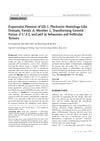 10 citations,
July 2011 in “Wound Repair and Regeneration”
10 citations,
July 2011 in “Wound Repair and Regeneration” New antiscarring strategies show promise, including drugs, stem cells, and improved surgical techniques.
 9 citations,
November 2018 in “Drug Discovery Today”
9 citations,
November 2018 in “Drug Discovery Today” Using skin stem cells and certain molecules might lead to scar-free skin healing.
 8 citations,
April 2017 in “Experimental Dermatology”
8 citations,
April 2017 in “Experimental Dermatology” More plasma leptin means higher baldness risk in men.
 8 citations,
September 2016 in “Asian journal of beauty & cosmetology”
8 citations,
September 2016 in “Asian journal of beauty & cosmetology” Dendropanax morbifera leaf extract could be good for hair growth and cosmetic products because of its antioxidant properties and growth factor effects.
 8 citations,
January 2014 in “Annals of Dermatology”
8 citations,
January 2014 in “Annals of Dermatology” The research suggests that p63 and TGF-β1 may help determine tumor type and malignancy in hair follicle and sebaceous tumors.
 7 citations,
January 2022 in “Scientific Reports”
7 citations,
January 2022 in “Scientific Reports” Acanthus ebracteatus Vahl. extract and verbascoside may help prevent hair loss and promote hair growth due to their anti-inflammatory properties and ability to protect against cell death.
 7 citations,
December 2017 in “Anais da Academia Brasileira de Ciências”
7 citations,
December 2017 in “Anais da Academia Brasileira de Ciências” 6-Gingerol from ginger may slow down hair growth by affecting certain enzymes and growth factors.
 7 citations,
September 2017 in “Biomedical and Pharmacology Journal”
7 citations,
September 2017 in “Biomedical and Pharmacology Journal” Growth factors greatly affect hair loss, with different levels seen in men, women, younger patients, and at the start of the condition.
 6 citations,
January 2023 in “npj regenerative medicine”
6 citations,
January 2023 in “npj regenerative medicine” Transplanting growing hair follicles into scars can help regenerate and improve scar tissue.
 6 citations,
September 2019 in “Skin pharmacology and physiology”
6 citations,
September 2019 in “Skin pharmacology and physiology” RCS-01 therapy is safe and may improve skin structure by affecting gene expression.










